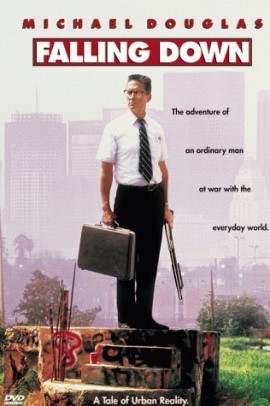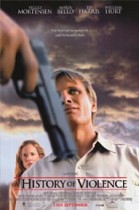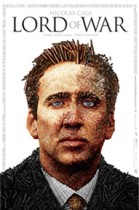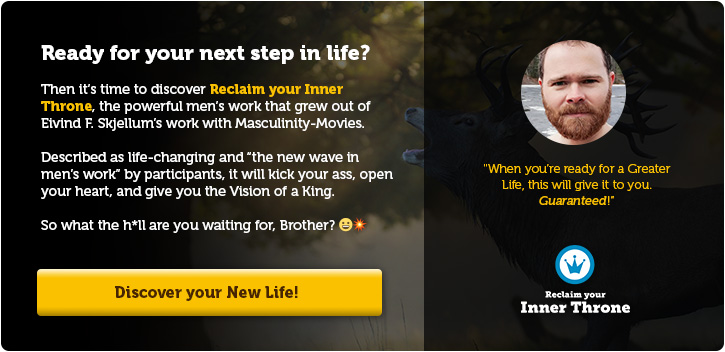Falling Down (1993)
Synopsis
Falling Down features a day in the life of former defense industry worker William ‘D-fens’ Foster. A traditional man rejected by the world, William is about to discover that if he fails to stand up for himself one too many times, he just might snap.

| Genre | Drama |
| Production year | 1993 |
| Director | Joel Schumacher |
| Male actors | Michael Douglas, Robert Duvall |
The man who was pushed too far
by Eivind Figenschau Skjellum
This review may be one of the hardest I’ve ever done. I’ve gone many rounds with myself in order to complete it. I finished the first draft back in May, just as I was heading off to Frankfurt for the Men and the future symposium. But as I was about to publish it, I read through it one final time – and found myself uninspired. I didn’t like what I read and chose to discard it. The perspective I took back then was based almost entirely on Spiral Dynamics and Integral Theory. This angle remains one of the most obvious ones to me.
The way I see it, Falling Down is clearly a movie about a clash of different stages of consciousness: Traditional (D-fens), modernist/capitalist (“the system”) and postmodern/liberal (all the narcissism on display). All of that is interesting. Yet “interesting” is deeply unsatisfying to me. I don’t care much about interesting. I want soul. I want dirt, grime and all that juicy stuff that modern life keeps us apart from. I want my writing to be conceptually intelligent, but I want the meat of it to go under the radar of the modern mind (which loves “interesting”), hitting those wet and hairy parts inside of us which remain wild. With Falling Down, that has been challenging.
D-fens the victim
William ‘D-fens’ Foster is a former defense industry worker who’s been laid off. He is a loyal patriot who seems, in his world, to have done everything right. So why was he fired? Why did his wife divorce him and then slap him with a restraining order? Unwilling to allow circumstances to bring him into a transformational journey towards increased depth and self-awareness, William is hellbent on staying on auto-pilot; as the movie opens he is making his way to “work” carrying an empty briefcase, a broken spirit and boundless denial.
It’s the hottest day of summer. William is a temperamental man and the heat is not helping. When an unpleasant shopkeeper won’t help him get money for a payphone, he snaps, and his journey into madness begins. The journey into madness is a wonderful metaphor, employed in many myths and movies. It’s the journey of stepping out of linear time and embracing “crazy time”, where things are not as they seem and the soul becomes exposed to the transformational fires that arise from a total lack of control. William’s descent does not seem a metaphorical journey, however.
A lost opportunity
William is portrayed much like a victim whose buttons have been pushed one too many times. And now, the urban wasteland he journeys through seems to conspire to move him into full acceptance of his capacity for destruction. There is clearly a theme of boundaries here, which highlights the archetypal Warrior. William’s boundaries have been compromised one too many times, and now he taps into his Sadist shadow in order to get back at the world. This theme is interesting and at times also stimulating. What frustrates me, however, is that the movie has this wonderful opportunity to intelligently describe the interplay between William’s inner landscape and the outer world, much like the mental asylum scene towards the end of The Fisher King. It could’ve shown how the world we see is a reflection of our inner sense of harmony (King archetype). But it doesn’t. In sitting with this movie, I have come to suspect that the movie makers simply did not have sufficient psychological wisdom to make the most out of a promising premise.
A clash of world views
D-fens is a traditional man. In spiral dynamics, the traditional stage of development is associated with the color blue. It signifies qualities like loyalty, duty, allegiance to God and country, rules, morals, justice etc. The people with whom I identify share my ethnic and cultural background, beliefs and sexual orientation. One of the central themes in Falling Down is the clash between William’s “wholesome traditional values” and the values of his surrounding world.
Being a loyal patriot seems to not be enough for the “system”; it still rejects him. William’s struggle becomes a metaphor of sorts for the clash between the values of small-town rural America and a modern/postmodern urban mentality. Evolution of consciousness takes us from the traditional stage of development to the rational. The rational stage of development is associated with the color orange and signifies qualities like rationality, striving for success (the American Dream), efficiency, profit (capitalism) and mastery of skills. Science trumps God and skill trumps race.
The sphere of people with whom I identify grows to include those who are useful to me (who provide relevant skill), negating the focus on ethnicity, religious allegiance and sexual orientation. The shadow is using people as if they were machines, raping the planet for natural resources, extreme focus on being successful and top dog. My favorite scene in the movie is when a victim of “the system” makes a big ruckus in front of a bank and is subsequently taken away by the police.
He leans out of the window as he pleads with us not to forget him. This is a great scene, elegantly exposing the shadow side of capitalism. Human beings eventually get fed up with the lack of humanity on the rational stage and move into the pluralistic stage of development. It’s associated with the color green and signifies qualities like empathy, community, tolerance, consensus, egalitarianism.
At this stage of development, I identify with all people in the world. The shadow side is a flattening of hierarchy and meaning, narcissism, irresponsibility and naivete. These are the major stages of Consciousness at play in Falling Down, though there’s also a bit of egocentric red. Here’s a scene where that chaotic egocentric red clashes with William’s traditional values: The Nazi-sympathizing shopkeeper in this scene is largely on the egocentric stage of development (which precedes the traditional). D-fens has temporarily regressed to that level due to the extreme pressure he is under (a state change), but his values and ethical compass are still traditional. This scene displays the confusion that can arise when we don’t get the concept of states and stages of development.
A parade of stereotypes
The more I dig into Falling Down, the more I realize it doesn’t give substantial return on my investment. While I can watch the movie and enjoy it, when I start digging into it, there is simply not much treasure to be found. Most of the characters in the movie feel totally one-dimensional to me. Almost every person D-fens encounters on his odyssey through the urban wasteland of Los Angeles is an asshole.
Rather than feel like well-rounded personalities, they seem like vehicles for an agenda: To paint a picture of a hostile, cynical world that doesn’t give a rat’s ass about people. They seem to exist merely to offer justification for William’s actions. I feel some intensity around that. A bit of anger. Because I don’t like it when a movie tries to manipulate me into seeing the world as more hostile than it is.
There is kindness in this world. Generosity. Love. I guess the movie makers were unable to honor this truth and still maintain a cogent storyline. But Falling Down is too literal a story to take such liberties with reality. The consequence is that Falling Down triggers my bullshit detector.
The takeaway for us as men
William D-fens Foster was fired from his job, lost his wife and the right to see his daughter, and now lives with his mother. Why? Because he didn’t have the capacity to be with his temper with transparent vulnerability and was unwilling to claim responsibility for his lot in life. D-fens is a frozen man. And like all frozen men, he is completely stuck. When we hide our truth, say yes when we mean no, accept harassment and settle for less, we too risk eventually moving into an uncontrolled outpouring of more primal impulses.
This is a familiar theme for those of you who have read my KWML article and grasped the bipolar shadow dynamic. William’s victim mentality exposes his lacking ego development, which puts him at the mercy of archetypal forces. Mythologically speaking, Falling Down is the journey towards William’s Red Knight. The Red Knight is that part of us which wields power and engages in territorial disputes (boundaries).
It’s hugely important to us as men and relates to our fundamental feeling of safety and our ability to take up space in the world (read more about the three knights). But as Falling Down shows us, this primal power is also dangerous when wielded unskillfully. That is why a man’s accessing of this “red” has been taken so seriously in tribal cultures. Integrating those primal impulses and then surrendering to a higher power is one of the central themes that the process of initiation addresses.
Conclusion
Falling Down tries to make a commentary on a society in decay. In the process, it oversimplifies reality and makes sweeping observations lacking in wisdom and nuance. William’s movement into “red” might get your hormonal man-juices bubbling a bit (reminding you of all those times you let yourself be fucked with), but it falls short of giving us a real sense of empowerment. While I empathize with William’s difficulties (I have felt them and I imagine must of us have), I’m not impressed with how he deals with them.
I find his inclination to see himself as a victim annoying. And yet, there’s also real tragedy in this story. This man lived such a repressed life, so in denial of his own challenges and needs that in the end, he figures it’s not worth it. He is the archetypal frozen stoic. Unable to own that he has created this life for himself, William is at the mercy of dancing shadows (which is, annoyingly, what the movie fails to point out). And his story reminds me that in order to become truly powerful men, we must see ourselves clearly and recognize our needs and desires. If not, we will try to manipulate the world to meet our own disowned desires, and we will do so in disconnected, blaming and totally miserable ways.
Powerful ideas from Falling Down
- In order to be powerful men, we must be willing to see ourselves clearly.
- There are different stages of consciousness in the world and they don't understand one another (not until they develop into 2nd tier consciousness).
- Every little blow to our dignity builds up.
- If we fail to protect our psychological boundaries in empowered ways, we may end up becoming dangerous to ourselves and our surroundings.
- Sometimes, the guys who look most "perfect" on the outside are the most messed up on the inside.



